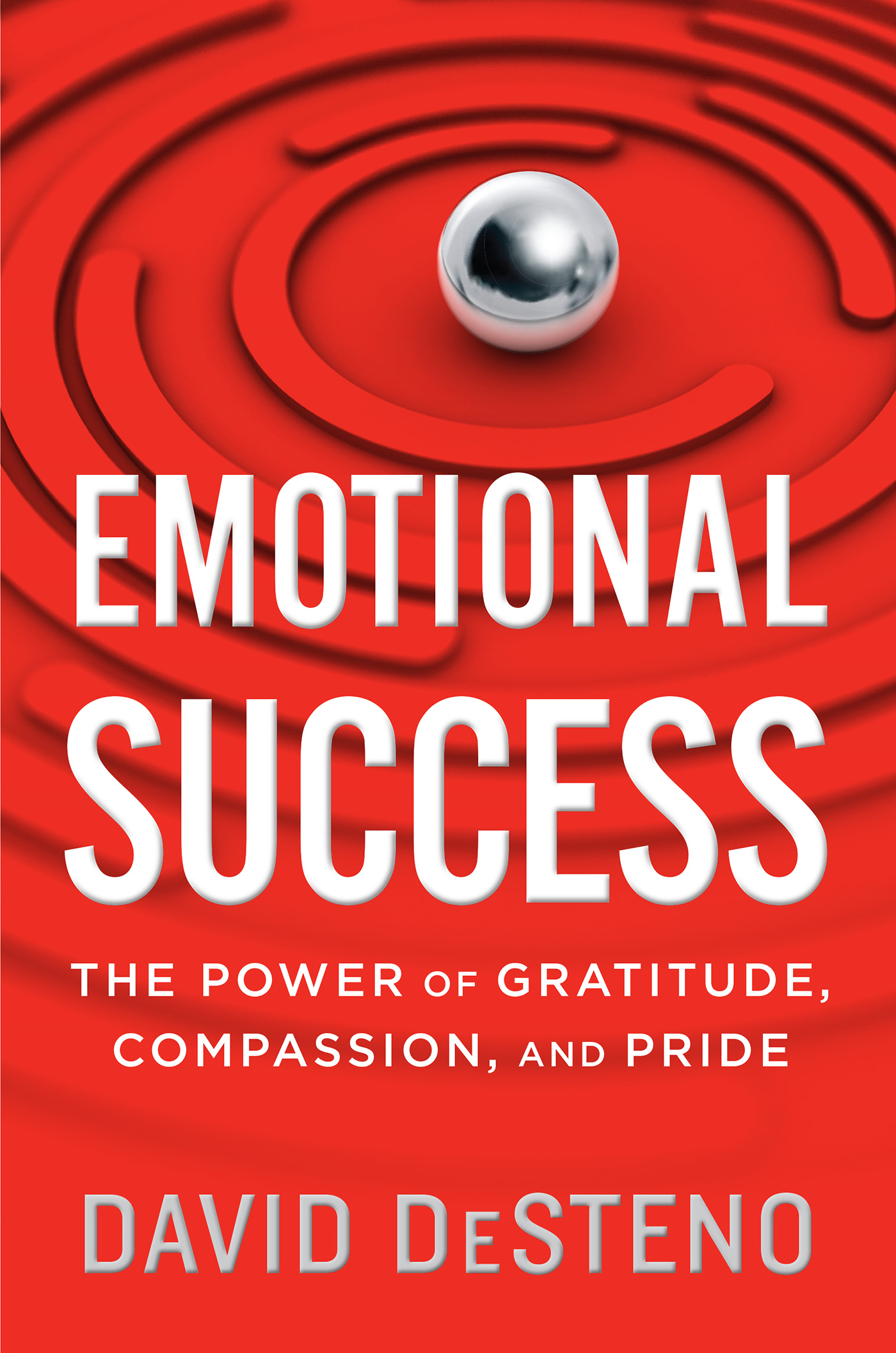We’re a society obsessed with success. And whether it’s at the office, in managing finances, in bettering health, or even in pursuing an unlikely dream, decades of research have confirmed that a central ingredient for obtaining that success is self-control. By that, I mean the ability to resist or sacrifice immediate pleasures in efforts to obtain greater rewards or achieve long-term goals.
Given our pervasive interest in succeeding, it’s no surprise that the shelves of local bookstores are filled with bestsellers like Willpower, How Children Succeed, and Grit, all of which promise insight into how perseverance and patience can affect our lives for the better. Not to be outdone, magazines from The Atlantic to People routinely feature articles on the benefits of self-control and how to obtain it.
I don’t mean to criticize this emphasis on self-control and valuing the future. To the contrary, I think we need it. And while it’s certainly true that the idea of self-control’s benefits isn’t new – we can see it extoled in moral tales going back for centuries – what is new is that this idea has moved from philosophy into empirical proof. The benefits of self-control aren’t a matter of opinion anymore; they’re quantifiable. And what can be quantified can, in theory, be maximized. The million-dollar question, of course, is, How? How can self-control be enhanced?
It’s here that I fear we have gone astray. For almost 50 years, we’ve been developing science-based strategies meant to help us reach our future goals. Yet, on average, we are no better at delaying immediate gratification than we were in the 1960s. If anything, our impatience and desire for immediate satisfaction are on the rise. As individuals and as a society, we’re spending more on impulse buys or conveniences rather than saving for a rainy day or retirement. We’re diverting our attention to games or social media on our smartphones rather than to focusing it on learning and honing skills we need. We’re satisfying our sweet tooth and, as a result, expanding our waists simply to gain momentary pleasures at a great cost to our future wellbeing. In short, we’re planning less for the future, or at a minimum, not caring as much about what that future will bring. And while it’s undoubtedly true that each of these examples of impatience and short-sightedness stem from many factors, one cause that underlies them all is a growing bias toward pleasure in the moment.
On any given day, most people fail to stick with their daily goals about 20% of the time – a percentage that climbs quickly if they’re busy, tired, or stressed. That means almost once out of every five times we try to work harder, eat better, save more, or study for a test or performance evaluation, we’re going to fail to do it in favor of something else that’s more fun in the moment. And when decisions involve important goals – the ones that truly matter to people – the success rate is even worse. Only 8% of New Years’ resolutions are kept throughout the coming year. Twenty-five percent fail in the first week. The result is that most of us frequently end up feeling powerless to stick to our goals, and even worse, upset with ourselves for loafing, splurging, binging, or otherwise giving in to a desire for some short-term pleasure that will ultimately cost us.
This fact raises an intriguing, and troubling, question: If delaying gratification and valuing the future are so important, and if we’ve been using science-backed strategies for decades to help us do it, why are most of us still so bad at it? One would think that the mind would come equipped with tools to meet the challenges posed by a lack of impulse control.
In my view, it does. We’re just ignoring the them. Willpower and similar commonly employed tools for self-control turn out to be rather fragile and, at times, stressful to use, meaning that our ability to maintain focus and effort often wanes over time. What else is there then? Emotion. In truth, emotions are among the most powerful and efficient mechanisms we have to guide good decisions. Sure, there are some emotions, like desire, that focus on immediate wants. But there are others that make us willing to sacrifice for the long-term. The trick to success, then, comes in understanding that emotions don’t only happen to us; we can use them to help achieve our goals – an outcome that also hinges on developing the wisdom to call upon the right emotions to meet the challenges at hand.
When it comes to long-term success, the “right” emotions are principally these: gratitude, compassion, and pride. These emotions, unlike basic feelings of happiness, sadness, anger, or fear, are intrinsically tied to social life, and that provides the key for their effectiveness. At base, social living regularly requires a willingness to accept costs in the moment to ensure better days ahead. We didn’t originally develop self-control so that we could study for and ace exams, save for retirement, or complete the Whole 30. For most of our evolutionary history, none of that mattered or even existed. What did matter to survive and thrive was having strong social bonds – relationships that would encourage people to lend support to others in need while knowing full well that their sacrifices would be returned if and when required in the future. Establishing and maintaining such relationships required behaving morally. It meant being fair, being honest, being generous, being diligent, and being loyal. In short, morality itself was adaptive; being perceived to have good character marked a person as capable of overcoming a desire to be overly selfish and, therefore, as a person with whom it was safe to partner. And it’s precisely the emotions of gratitude, compassion, and pride that make us more willing to behave in these valued ways.
Think about the last time you felt any of these three states – really felt them. They probably pushed you to accept some type of immediate costs. Gratitude has led me to spend many hours repaying favors or debts. I’ve moved more couches and spent more time making gifts for friends than I thought possible, all to make sure that others knew I valued what they had previously done for me and, in so doing, keep those bonds from fraying down the line. Compassion is similar. It moves many people to give money, time, or emotional support to others in need. It encourages an altruism that ensures efforts will be returned for our kind acts when we need it. Pride, too, can encourage people to sacrifice for future gain. I’ll always remember one of my students telling me that the only thing that allowed her to get up at 5:00am every day to practice rowing on the frigid Columbia River was the pride she felt in being part of her team. Emotions like these grease the wheels of social life by making us act in ways that, though costly to our pleasure or resources in the short-term, bring the promise of greater rewards in the future. They give us self-control.
What scientists are now beginning to realize is that these same emotions – the ones that push us to value the future in order to grow our social success – can be co-opted to help us achieve success in any area of life. Just as they nudge us to sacrifice in the short-run to better our relationships with others, we can use them to manage our relationship with someone else who’s central to our hopes and dreams: our own future self. Feeling pride or compassion has been shown to increase perseverance on difficult tasks – a hallmark of grit – by over 30 percent. Similarly, gratitude and compassion have been linked to better academic performance, a greater willingness to exercise and eat healthy foods, and lower levels of consumerism, impulsivity and tobacco and alcohol use.
Most important, perhaps, is that using these emotions as tools for success also helps solve the growing plague of loneliness. Today, more than 50% of Americans report feeling lonely, especially in their professional lives. But study after study has shown that those who are seen as grateful, warm, and justifiably proud of their abilities draw others to them. Because these emotions automatically make us behave less selfishly, they help ensure we can form relationships with people who will be there to support us when we need it. Cultivating them will maximize not only “resume virtues” – those that underlie professional success – but also “eulogy virtues” – those for which people want to be remembered. In so doing, these three emotions will lead to a more balanced, resilient, and enduring success.
Excerpted from EMOTIONAL SUCCESS: The Power of Gratitude, Compassion, and Pride by David DeSteno. Copyright © 2018 by David DeSteno. Used by permission of Houghton Mifflin Harcourt Publishing Company. All rights reserved.


